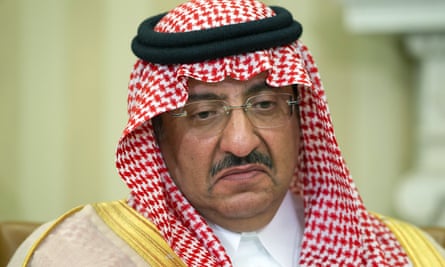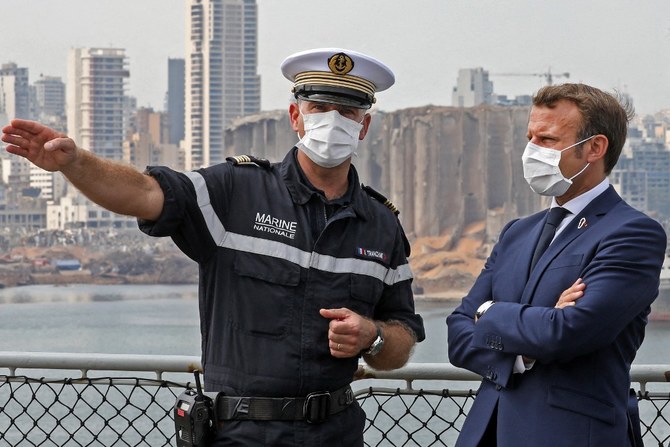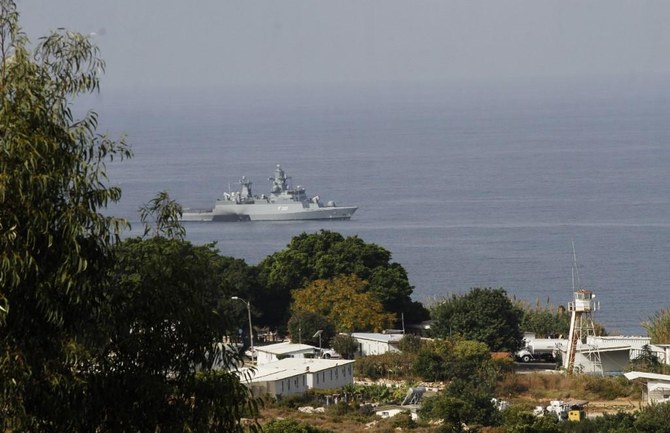(MENAFN – Daily News Egypt) Lebanese President Michel Aoun said that Lebanon does not mind resorting to international arbitration if the country fails to reach a fair agreement with Israel on maritime border demarcation, al-Akhbar local newspaper reported on Saturday. The indirect talks between Lebanon and Israel started on Oct. 14. The next round of […]

by Patrick Wintour — theguardian.com — Mohammed bin Nayef – the detained former Saudi crown prince and interior minister – has been the victim of a sustained and coordinated attack from inside Saudi Arabia on social media that risks endangering his personal safety, lawyers acting for him have warned. The lawyers have written to YouTube demanding it take down a video, saying the content claiming he had been plotting to bring down Crown Prince Mohammed bin Salman runs the risk of inviting serious retribution and harm to him. YouTube has not yet acted on the complaint. Separately, it has emerged that an apparently spontaneous surge in the number of tweets ahead of the US elections claiming Mohammed bin Nayef was part of a Democrat-led “deep state” plot to destabilise the Saudi Arabian royal family was orchestrated largely through bots run by supporters of Bin Salman, research shows.
The two developments serve to underline the perilous state of the 60-year-old Bin Nayef, who was close to the Obama administration and to then-vice-president Joe Biden. The former interior minister, seen as critical to bringing al-Qaida under control inside Saudi Arabia in the wake of the 9/11 attacks in New York, has been under house arrest since March. He was ousted as crown prince in 2017. A cross party group of British MPs has been denied access to him but is due to produce a report on his welfare before Christmas. The report is likely to call on the incoming Biden administration to press for his release. In the letter to YouTube, the lawyers point out the claims in the video that Bin Nayef has been at large and at one point seen next to Biden are totally false, and part of an elaborate conspiracy theory that he is working to undermine Mohammed bin Salman.

by AFP — Lebanon has detained a Lebanese-French businessman who was close to former French president Nicolas Sarkozy after receiving a request for his arrest from Interpol, a judicial source told AFP Friday. “Internal security forces have detained (Ziad) Takieddine, based on an arrest warrant Interpol sent the public prosecution, over him being wanted by the French authorities over involvement in corruption and funding Sarkozy’s campaign,” the source said. Takieddine was once the main accuser in an inquiry into suspected Libyan financing of Sarkozy’s 2007 election campaign. The businessman was investigated in late 2016 after he told the press he had delivered millions of euros in cash from Libyan dictator Moamer Kadhafi.
Sarkozy caught a break last month when Takieddine suddenly retracted his claim. The 70-year-old businessman fled to Beirut after a French court in June condemned him to five years in jail in a separate case involving millions of euros in kickbacks from arms sales to Pakistan and Saudi Arabia signed in 1994. The judicial source said Takieddine was being questioned by the security forces under a judge’s supervision and would be transferred to the general prosecution for further investigation on Monday. If the charges against him were found to be justified, he could be tried in Lebanon as a Lebanese citizen, or extradited to France, the source said. On Thursday, former French interior minister Claude Gueant was charged with being part of a criminal conspiracy in the case over Libyan funding.

by dw.com — Foreign donors have said Lebanon needs fundamental reforms before the debt-ridden country gets any more support. But a new international aid package runs the risk of fostering a business-as-usual approach in Beirut. After a video conference involving 32 nations and 12 international organizations, including the United Nations, the European Union and the World Bank, a new package of financial and humanitarian aid for Lebanon was agreed on. The explosion of ammonium nitrate stored in the Lebanese capital, Beirut’s port in early August was just the latest blow to the country, where a political and economic crisis has been ongoing. Following a financial crisis in 2019, popular protests against a government widely perceived as corrupt and ineffective began in mid-October that year. The Beirut port explosion, which killed over 200 and did over $4 billion worth of damage, led to eventual resignation of the prime minister and his Cabinet. A new government has yet to be formed. Since 2019, inflation has soared as has unemployment and locals living in poverty. The value of the Lebanese pound has plummeted, and local banks have restricted cash withdrawals. The COVID-19 pandemic has only exacerbated Lebanon’s problems and some now call this the worst crisis the country has faced since its 15-year civil war ended in 1990.
Lebanon to get fresh funds
Last night’s decision to establish a new fund — the Reform, Recovery and Reconstruction framework, or 3RF for short — will see Lebanon receive additional funds. Details of the fund and how it will be managed are to be announced on Friday. According to the French government, more than €280 million($338 million ) in emergency aid have already been handed out, after the first donor conference, held immediately after the port explosion. Now, member states of the European Union alone are pledging a further €100 million, on top of the almost €70 million handed out already, European Council President Charles Michel said in a statement. French President Emmanuel Macron has been pressuring Lebanese officials to reform and will visit the country again later this month. He has previously said that until the political problems at the heart of the Lebanese financial crisis are solved, the country should not get a bailout.

BY JACK DETSCH — foreignpolicy.com — The Trump administration is worried that Syria’s Bashar al-Assad regime is working to undermine neighboring Lebanon by driving up exchange rates for its weakened currency and ratcheting up influence on the fragile government through Iran-backed Hezbollah, according to a State Department finding shared with Congress this summer and obtained by Foreign Policy. Under pressure from U.S. and international sanctions over its human rights abuses and chemical weapons use during the nearly decadelong Syrian civil war, the Assad regime has long been dependent on siphoning money from the Lebanese banking system and smuggling the cash across the border along with fuel, flour, and wheat, experts said, something that Lebanon’s authorities have had trouble preventing. ,
“The Assad regime continues to exert influence inside the Lebanese government through Hizballah and other political allies, undermining Lebanon’s independence and sovereignty. Such influence poses significant challenges to Lebanon’s stability,” the report says. “The Assad regime contributed to Lebanon’s recent economic collapse by attempting to extract as much foreign currency from the Lebanese market as possible, making dollars very scarce in Lebanon and driving up the exchange rate for the Lebanese lira.” Lebanon’s currency has seen an 80 percent devaluation in the past year, a drop that has pushed many skilled workers, such as doctors, to leave the country.

by NAJIA HOUSSARI — arabnews.com — BEIRUT: As the UN hosted a second International Conference on Assistance and Support to Beirut on Wednesday, there was growing impatience among donors with Lebanese politicians. The virtual event, chaired by French President Emmanuel Macron and UN Secretary-General António Guterres, aimed to coordinate international aid efforts in support of the Lebanese people as the country continues to face political, economic and social challenges. The participants — including heads of state, international organizations, donors, NGOs and civil-society representatives — discussed the results of the first conference, which was organized by France after the Beirut port explosion and held on Aug. 9. It resulted in pledges of aid worth about $300 million in a fund managed by the World Bank that will be channeled through UN agencies and NGOs rather than Lebanese state institutions.
However, delegates expressed impatience with the failure of political factions in Lebanon to resolve their differences and work together for the good of their country. Four months after the Aug. 4 explosion in Beirut, and the subsequent resignation of Hassan Diab’s government, a new government has yet to be formed, delaying the economic and political reforms needed to begin efforts to resolve the financial crisis. According to Reuters, the French presidency on Wednesday said: “No measures required in the French road map for Lebanon have been implemented and the Lebanese Central Bank’s accounts haven’t been audited.” It added: “American sanctions imposed on the Lebanese political class have not had any effect so far and will not help in forming a government.” This came after the leak of a conversation in which Dorothy Shea, the US ambassador to Lebanon, asked Nabih Berri, speaker of the Lebanese parliament, to “distance himself from Hezbollah.” She also hinted that “Washington will reject any government in which Hezbollah is represented and there won’t be any foreign aid without radical change.”
/cloudfront-us-east-1.images.arcpublishing.com/mco/IABPREZHUJHPNO47VJMVK7J4DY.jpg)
by defensenews.com – Aaron Mehta — WASHINGTON — The U.S. State Department on Tuesday cleared six Foreign Military Sales cases, potentially worth a combined total of $1.55 billion. The six cases, spread across South Korea, Saudi Arabia, Brazil, Croatia, Lebanon and Canada, were announced on the website of the Defense Security Cooperation Agency. DSCA announcements mean that the State Department has decided the potential FMS cases meet its standards, but this does not guarantee the sales will happen in their announced forms. Once approved by Congress, the foreign customer begins to negotiate on price and quantity, both of which can change during the final negotiations. Here are the details on each case:
Lebanon: The country seeks to spend $55.5 million to procure 300 M1152 High Mobility Multipurpose Wheeled Vehicles in two tranches of 150 each. Beirut currently operates more than 1,000 HMMWVs of various designs, according to the DSCA, which are primarily used to “counter violent extremist organizations and to secure its border.” The primary contractor would be American General, with work happening in its South Bend, Indiana, facility. This is the first FMS case cleared for Lebanon since the start of the Trump administration.
by naharnet — The new chief of Iran’s Quds Force, General Esmail Ghaani, asked Hizbullah during a recent secret visit to Lebanon to “avoid provoking Israel,” a media report said on Monday. “Ghaani, who succeeded General Qasem Soleimani as the head of the Quds Force, the elite unit of Iranian Revolutionary Guards in charge of […]

by NAJIA HOUSSARI — arabnews.com — BEIRUT: The fifth round of negotiations regarding the demarcation of the maritime borders between Lebanon and Israel has been postponed until further notice. This announcement came 48 hours prior to talks scheduled to take place on Wednesday. Reuters had quoted a Lebanese security source and an Israeli official saying that “the US-mediated talks were postponed until further notice,” with the Lebanese source blaming the delay on “Israel’s rejection of Lebanese proposals.” The office of the UN Special Coordinator for Lebanon Jan Kubis refused to comment on this move, as did the US Embassy in Beirut. Israel’s Energy Minister Yuval Steinitz had accused Lebanon of “changing its position regarding the maritime borders demarcation seven times,” adding that its positions so far had been “provocative.” His comment came after the fourth round of negotiations, held on Nov. 11 at the UN Interim Force in Lebanon’s (UNIFIL) headquarters in Ras Al-Naqoura. “Lebanon’s position during the fourth round of negotiations not only contradicts its previous positions, but also contradicts Lebanon’s position regarding the maritime borders with Syria, which takes the Lebanese island near the borders into consideration,” he added.
Steinitz also stressed the importance of “adhering to the principle of stability and settling the dispute according to what Israel and Lebanon had submitted to the United Nations. Any deviation from that principle will lead to a dead end,” he warned, hoping for a breakthrough in the upcoming few months. Middle East energy expert Marc Ayoub told Arab News: “The current suspension and postponement of the negotiations is for tactical reasons. Lebanon and Israel are clinging to their positions regarding the starting point of the maritime border demarcation. Lebanon wants it to be Ras Al-Naqoura, while Israel wants to go from unpopulated maritime ridges.” He added: “What is happening is just a rope-pulling process between the two sides. I think that the international community has to play an essential role in solving this issue, as it can benefit from the UNIFIL forces and their equipment to resolve the dispute and identify the coordinates according to international law. “I know that the American mediator will visit Lebanon and Israel to ease the tension and I think that what is happening is an attempt to win some time while waiting for the American decision.”

by dailystar.com — James Jabra — BEIRUT: Lebanon overcame a resilient Iraqi side 78-69 in an Asia Cup 2021 qualifier in Manama, Bahrain Sunday to book their place in next year’s continental showpiece event. It was the Cedars’ fourth win from as many games in qualification, maintaining their grip on Group D with eight points. Joe Moujaes’ side had limbered up nicely for Sunday’s vital encounter with a 115-60 trouncing of India Friday, but they were slow out of the blocks against table-proppers Iraq. Demario Mayfield was pulling the strings for Iraq in the first half, and a clutch of assists from the naturalized American saw Iraq take a narrow 40-36 lead into the break. But Lebanon, spearheaded by the talismanic Wael Arakji, swiftly regained the upper hand with a 19-5 run to open the third quarter



